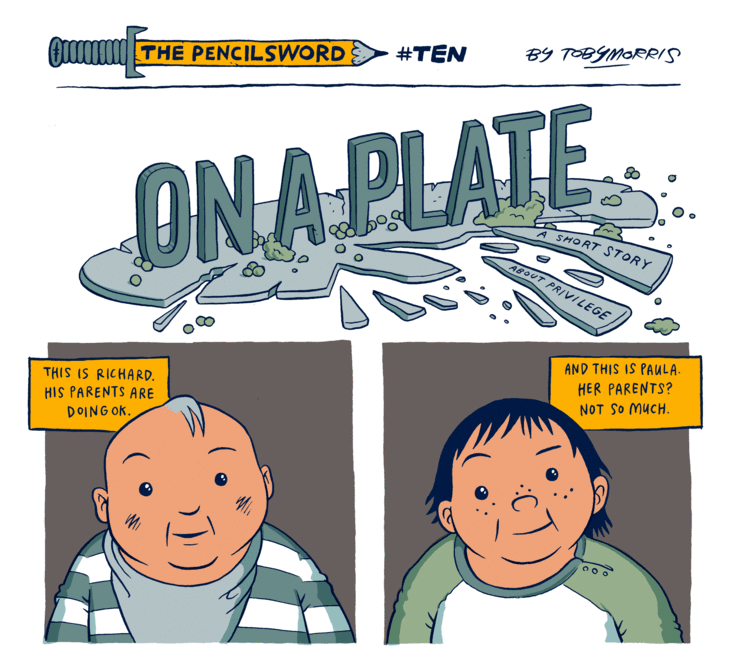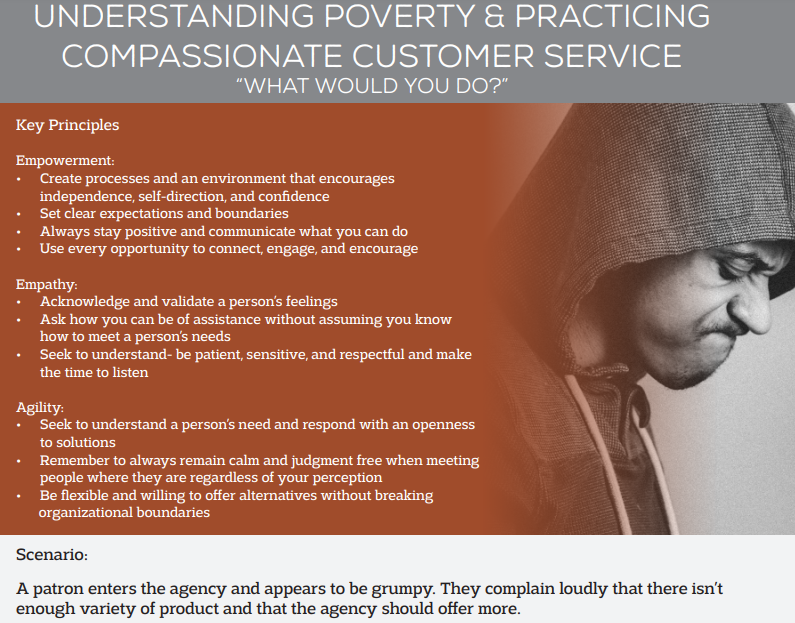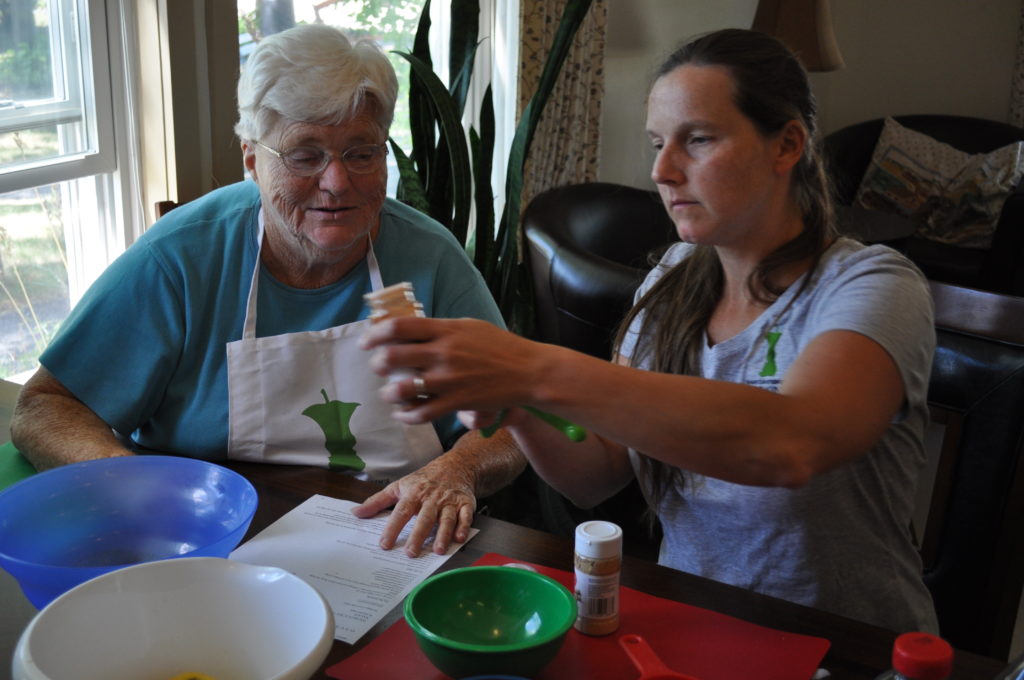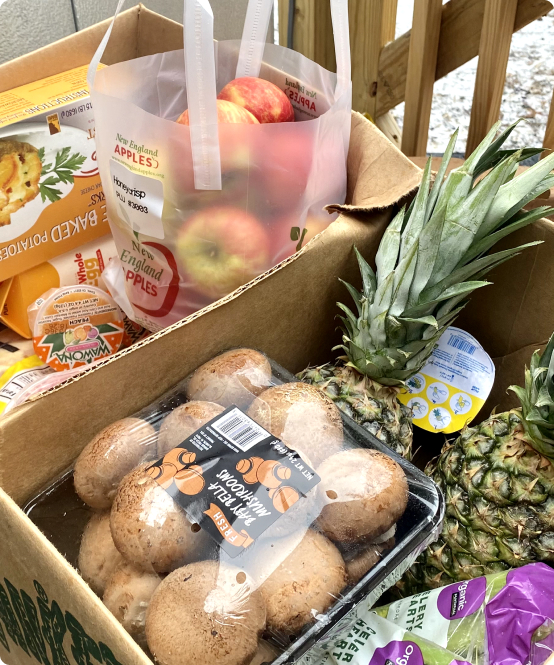Poverty in Service Training
Understanding poverty and compassionate customer service training. Jump to a section to get started.
- Section 1: Asset-Based Thinking
- Section 2: Poverty & Food Insecurity 101
- Section 3: Poverty Simulation Resources
- Section 4: Compassionate Customer Service
- Section 5: Preparing for Challenging Interactions
- Section 6: Compassion Fatigue and the Importance of Self Care
- Section 7: Additional Resources and Further Reading
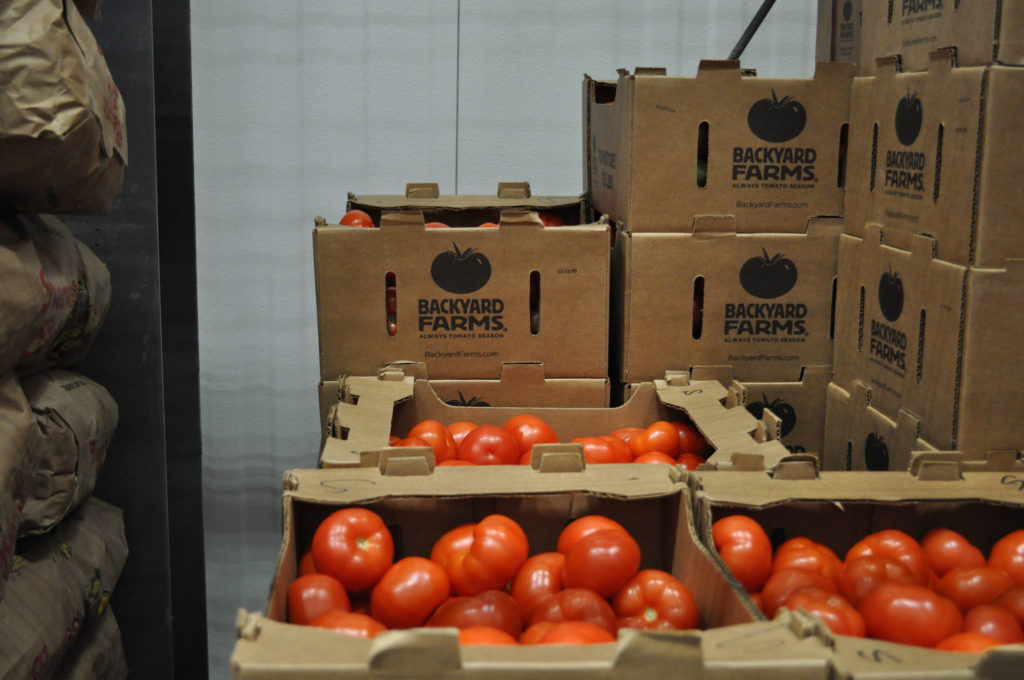
Section One
Asset-Based Thinking
To begin setting the framework for the Understanding Poverty and Compassionate Customer Service Training, watch this 13-minute TED Talk by Angela Blanchard on Asset-Based Thinking. This video explores viewing life through the lens of what is working, what strengths are present, and what potentials there are. Angela Blanchard is recognized for her pioneering work in asset-based community development that focuses on the human, social and cultural strengths of vulnerable populations.
Reflection questions:
- What do you see as the benefits of Asset-Based Thinking?
- In what ways could adopt Asset-Based Thinking be helpful in your work or in your community?
Section Two
Poverty & Food Insecurity 101
In this video, Good Shepherd Food Bank shares a brief overview of poverty and food insecurity in the United States and Maine. You will learn facts and common myth-busters.
Reflection questions:
- Did any information in the Poverty & Food Insecurity 101 video surprise you?
- Were there any facts you wish more people knew?
Section Three
Poverty Simulation Resources
These illuminating and thought-provoking resources are meant to help build your understanding of the experiences and hard choices many people living in poverty are faced with.
While no activity or comic strip will fully capture the diverse realities of poverty, these resources can offer new insights and reflections for those who have not experienced poverty and food insecurity. These activities aim to build empathy and allow one to fully imagine being in someone else’s shoes.
- Privilege means that some of us have advantages over others for any number of reasons we don’t control. Even when things haven’t come easy for some people, they can still have privileges that others don’t have. Check out A Short Comic About Privilege by Toby Morris to learn more.
- “Spent” Online Poverty Simulator. Urban Ministries of Durham created an online simulation about surviving poverty and homelessness.
Reflection questions:
- How did you feel during the “Spent” activity?
- Did you learn anything new or rethink any previously held beliefs about poverty?
Section Four
Compassionate Customer Service
Watch this Pantry Sensitivity Training developed by Access of West Michigan for pantry staff and volunteers. It offers practical advice for interacting with pantry members from a place of sensitivity, respect, impartiality, and empowerment.
Reflection questions:
- In what ways does your organization already use Compassionate Customer Service to create a welcoming environment?
- In what ways could your organization use Compassionate Customer Service to further improve the experience of those you serve?
Section Five
Preparing for Challenging Interactions – What Would You Do? Scenarios
Good Shepherd Food Bank created a series of challenging interactions that may occur as you volunteer at your local pantry.
We recommend practicing how you would handle these scenarios utilizing the key principles of empowerment, empathy, and agility.
Section Six
Compassion Fatigue and the Importance of Self Care
Providing Compassionate Customer Service starts with practicing good self-compassion. Learn what compassion fatigue is, how to recognize it, and how to prevent it so that your work at the pantry continues to be rewarding and fulfilling long-term.
Read The Cost of Caring: 10 Ways to Prevent Compassion Fatigue by GoodTherapy.com.
Reflection Question:
- What forms of self-care do you think would be most helpful to you in preventing compassion fatigue?
Section Seven
Additional Resources and Further Reading
Thank you for your time and commitment to learn more about poverty and compassionate customer service! As you seek to deepen your understanding of the root causes and effects of poverty and provide a dignified experience for community members, we have compiled a list of other helpful resources.
- Trauma-Informed Care at Food Pantries and Meal Sites
This presentation, created by the AIDS Resource Center of Wisconsin, defines Trauma-Informed Care, shares how trauma affects those we help and offers suggestions for how to bring a Trauma-Informed approach to your pantry or meal program. - Donna Beegle’s Story- The Crossing
- This is what happened when I drove my Mercedes to pick up food stamps from the Washington Post
- The Shocking Truth About Food Insecurity by Clancy Cash Harrison
- Nadine Burke Harris TED Talk on ACEs (16m video)
- About Strengthening Families and The Protective Factors Framework
- Moving Beyond Basic Needs to Break the Cycle of Poverty – TED Talk by Kristen Miale, president of Good Shepherd Food Bank
